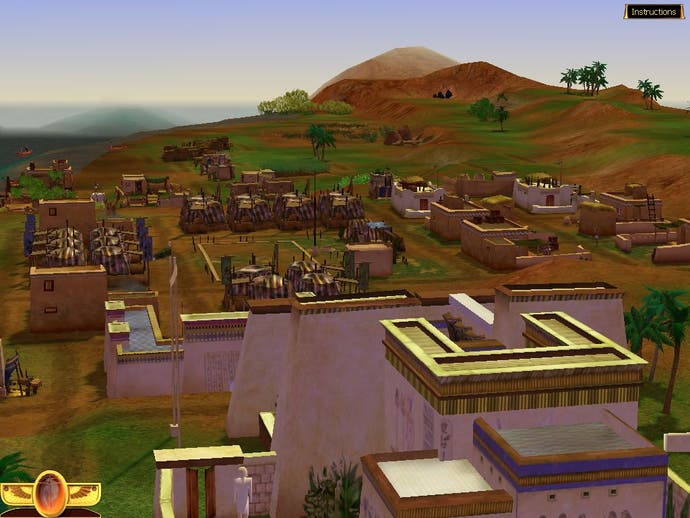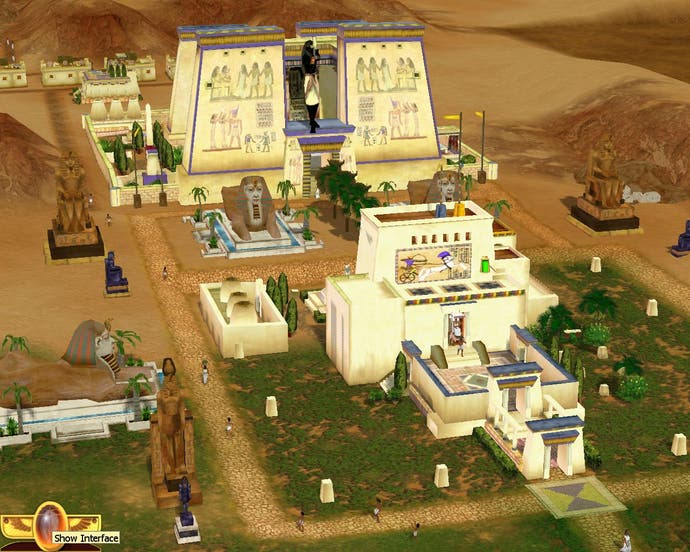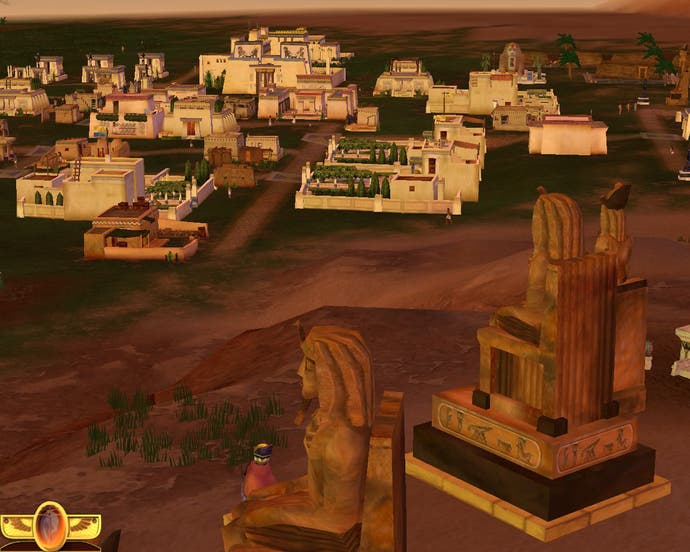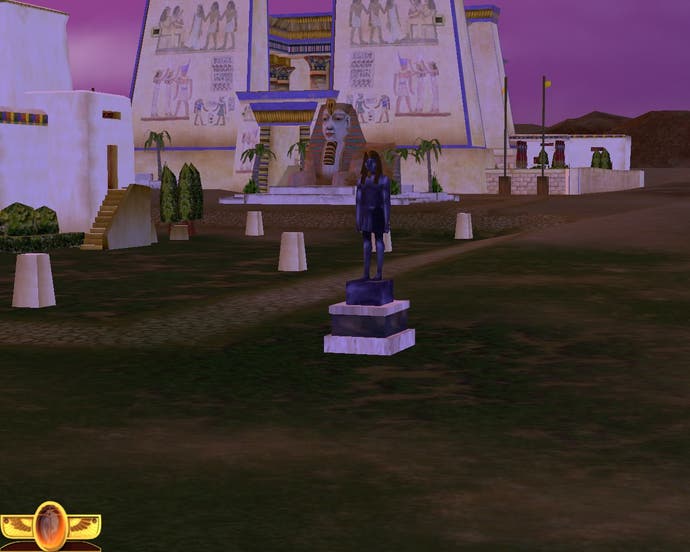Immortal Cities: Children of the Nile
Why did the Egyptian Swimmer go to the psychologist? Coz he was living in... oh, forget it.

Cute fact about Pharaohs; some, apparently, ceremonially ejaculated into the Nile to secure the requisite inundation of the Nile to replenish the farm-lands. Ruler of an empire, cheerfully knocking one off the wrist while an anxious crowd waits and an uncaring Nile sits there. Don't see any developer building that into a game.
Sadly. I wonder how we'd react if they did.
Let's approach Children of the Nile tangentially. Between sessions trying to organise the economic infrastructure of pre-history Egypt, I found myself browsing the Darwinia forums. Specifically, threads discussing the demo's merits. A few stick to my mind, where some this-generation semi-literate gamers, while enjoying much of it, were unable to accept an RTS which approached the genre in such a way. There's no excuse for pathfinding like that in an RTS. And so on.
Except that Darwinia isn't actually an RTS. Influenced by it, yes, and with a third-person group-control system of the genre, but far from any form of RTS. It hasn't pathfinding because it's an action game, ala Cannon Fodder, and working your way around the environments is an essential part of the game design. It doesn't play like an RTS because it isn't an RTS And then I clicked back to Children of the Nile and thought... well, is this the same thing? At first glance, it looks like a city-management game, but does its core lie elsewhere?
In other words, I've got the feeling criticism is so terribly debased that we wouldn't be able to deal with originality even if we saw it.
Immortal Cities, designed by the minds who created Pharaoh, is an atypical City Management game. While I haven't overwhelmingly enjoyed it, I'd be a liar if I said there wasn't something distinctly interesting here. And if it hasn't separated itself entirely from the games that have foreshadowed it, its attempts endear and charm.

The basic concept is simple. You're a Pharaoh (or rather, a dynasty of pharaohs, since the succession of your line is a central part of the game). You have to manage the budding Nile-based civilisation by organising the working and professional classes to create a thriving community - or, at least, a thriving enough community to complete your mission objectives and/or construct a suitably towering edifice for you to be buried in.
So far, so management game. You understand this. In fact, Children of the Nile's problem is that the fundamentals are so understandable that we lose track of what else is there. Primarily, it takes a hefty influence on the more post-Sims influenced games, and has an impressive amount of information on every individual in the world. And it really is a hefty amount of information. While a management game is perennially based around being once-removed from the direct control of your populace, this occasionally crosses over into something analogous to trying to thread a pile of mating eels through a toilet-roll tube. People have their own ideas what to do, and Anubis damn you if you try and force them to do something they don't want to. It's a game about creating a social context to make people naturally do what you wish rather than anything more brutally forceful. (Though there are exceptions - the middle-classes of Priest, Overseers, Scribes and Commanders can be dictated to pay attention to particular aspects. Which is thankful, as they're a terribly scarce resource, with their numbers firmly linked to the fame of your pharaoh.)
So, while you say which types of houses are to be constructed in which place, you're reliant on your populace coming along and filling them, the builders deciding which places to construct forth and so on. Its simulation places three night/day cycles to a year, and on each it's clear that every individual in the world pretty much decides what they're going to get up to today. And since every strategy game since Theme Park has made the "Every person in the world has a personality" line in the hype, it's worth separating what Children of the Nile does to everyone else. Every house has a family in it, which ages and dies. They even have a family history - click and see how they've moved from profession to profession as their life-paths ebb and flow. Be surprised to see how in a few decades a family progresses from subsistence farming to relaxing nobles and...

I may have lost you here. In which case, Children of the Nile may have lost you. While as a strategy game it's interesting enough, it's glacially slow paced. The speed-time ability is limited to a relatively sluggish x2.5, so if you play purely for the completion of levels, then you're going to be relatively alienated. It's certainly one which you can, with a relatively stable civilisation, leave running while you wander off to do the dishes - well, if you're willing to accept suboptimal management. There's lots of waiting, if you're just interesting in winning. But it's a game that's actually interested in a lot more than just winning. It's about creating a world - your world - which you can observe and examine.
In some ways, the best parallel is games like Deus Ex and Fable which allow you to personalise the game in - ultimately - meaningless ways which add to your own experience. It's not just about winning the game; it's about winning the game in style. As well as the many elements you require an economic infrastructure to construct, there are lots of decorative things you can just lob down on a whim to prettify your kingdom. Rather than just concentrating on making the best kingdom in the world, its limitations in the speed-up function and similar make it more about ruling the best kingdom in the world. And by that, I don't just mean what orders you give, but also appreciating what stimulus it offers you. With the grand array of interactions and animations - and in terms of seeing a world living, it's genuinely impressive - it makes Children of the Nile into the sort of game which stresses journey over destination.
Personally, I think the extraneous stuff works better in the aforementioned single-avatar games as you're closer to the detail. Being a city-based game, it's a little too easy to get separated from the world and just ignore the melee of social life bubbling beneath your nose. However, if you're willing to let go and just breathe the land... well, it's a relatively unique take on the Management game. Just a terribly slow paced one.

Which makes it a game that seems almost deliberately designed to be impossible to review between receiving a copy and having to publish a review in a useful time-frame (i.e. When the game comes out). It took me three hours to play the training missions. I've completed games in less time. And, to make it worse, it's a game the more you push, the less you enjoy. To get the most of the game, it's important to sit back and observe this little world you've created. If you do that, you'll be rewarded.
Interestingly, it's also a management game that doesn't pretend to have a perfect solution to the world. Towards the end of the training, there's a brief moment where it mentions that not even Pharaoh can find a solution to everything. Some people are always going to be unhappy in a civilisation... and you blink. Because that's a radical departure from the standard Management blueprint. You can't make everyone happy - in some ways, it's a choice of who you want to make miserable...
So: there's the dilemma, really. It's an innovative management game in many ways... but it's also a glacially slow one that this reviewer particularly doesn't find overwhelmingly engaging. Not all experiments succeed, and while its successes and design places it in the more appreciated example of its type, you can't help but feel separated from the babble of life before you.
If you're the sort who, when presented with a river, like to crouch and examine the eddies, this may be for you. If you just want to know what's downstream... well, less so.

